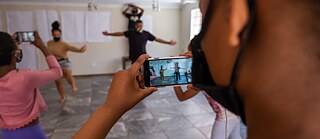International Relief Fund 2020
Let the spark fly

The Outreach Foundation in Johannesburg does neighbourhood work in the city centre. With funds from the International Relief Fund of the Goethe-Institut, the German Federal Foreign Office and other foundations and cultural intermediary organisations, it was possible to continue an intergenerational theatre project that would not have existed in this form due to Corona.
By Kwanele Sosibo
From Pietersen Street in the thick of Hillbrow, you might miss the Outreach Foundation building complex, even if you know where you are going. On my visit on a Saturday noon in early November, I am escorted into the exact rehearsal building by a pair of ice-cream eating semi-adolescents who weren’t even going there. It is a clear sign that the Outreach Foundation, nestled among high-rise apartments and office blocks, and built on an old church site, enjoys a level of fame among youths, and with good reason.
The foundation’s Performance Arts Programme, tied to the Hillbrow Theatre, sits at the south end of a Lutheran Church compound, flanking Edith Cavell street. It comprises a group of heritage buildings that are dwarfed by a face-brick old age home complex. Once in the submerged courtyard, I go up a flight of stairs leading to a rehearsal room at the back of the compound, where I encounter a group of about a dozen masked children going through a high-octane piece of choreography by Big Boy Ndlovu. Ndlovu, an alumni of the performance arts program himself, is now among its facilitators. He leads from the front, counting out steps of a stop-start routine with energetic emphasis. Periodically, he pulls back to observe, then rejoins again. “Five, six, seven, eight…” After a while, the kids pause to catch their breath.

As Denyschen speaks, Gcebile Dlamini, a facilitator, is co-ordinating with a different group of students via zoom. After the filming, the students take turns being critiqued. She is either pleased with the results or light on criticism. After the session, the students end their day with an R&B tinged rendition of "Nkosi Sikelel’ iAfrika" (political anthem as well as part of the national anthem of South Africa, editor's note).
As they pack up, Qhama Olivia Jack is the first student I interview. She is a student at the nearby St Endas Secondary School in Hillbrow. “I joined in 2018 for drama,” she says.“But I didn’t know there was dance too. At first I was like, ‘Ag, I’m not here to dance, I’m here to act.’ But then I just got comfortable and I forced myself to dance, which I really love now and I’m just learning different things within the space.”
Rozelle Philander, formerly of the Northern Cape, joined the group after losing her grandmother, who, more than her parents, was a fervent supporter of her aspirations in the dramatic arts. “I never got to properly mourn her,” she says from the courtyard outside of their rehearsal space. “When I’m on stage doing what I love. I feel like I’m honouring her. I feel a kind of peace.”

Dlamini, a director with the project since 2012, says she uses a lot of personal storytelling as a device to get her students to open up. “I work a lot with personal narratives,” says the actress who also lives in Hillbrow. “When they speak about living in town, in flats, I can say, ‘This is how I grew up. What do you think about this, this and that?’ Then we have debates and conversations, and then it sparks from there.”
Dlamini tries to keep the space dynamic. The kids regularly watch theatre shows (which they critique), travel and perform overseas and host other performance art groups for discussions and performances. Above and beyond the challenges of belligerent parents who sometimes pull their children off the programme and a dropout rate she attributes to the challenges of adolescence, it is watching the kids move from timidness to confidence that makes it all worthwhile.

Her colleague Gerard Bester, a manager in the wider Outreach Foundation and a director with the performance arts programme, is generally a garullous, amiable figure. His pensive streak only shows up when we discuss funding. He intimates that within the broader foundation, the role of the performance arts programme is being reassessed, with a possibility that priority may be given to the skills development segments of the foundation. In a sense, work he has thrown himself into for well over a decade faces being scuppered.
For projects like the intergenerational programme they conduct with the nearby old age home (an affiliate of the Outreach Foundation), the Goethe-Institut threw them an unexpected lifeline with relief funding.
“It’s very rare to receive a phone call inviting you to submit a proposal, and that we had been one of the selected organisations in South Africa,” he says. “It was a wonderful acknowledgment of the previous work we’d done with the Institut and their continued faith in what we do. Covid-19 has made 2020 a year of extreme loss, disruption and uncertainty. So the Relief Fund was about giving us support to reimagine projects that we were going to do this year, projects that would not have happened.”
With that thorn averted for now, Bester’s mischievous smile returns, and he turns his attention to Hillbrow’s living history, possibly his favourite subject.